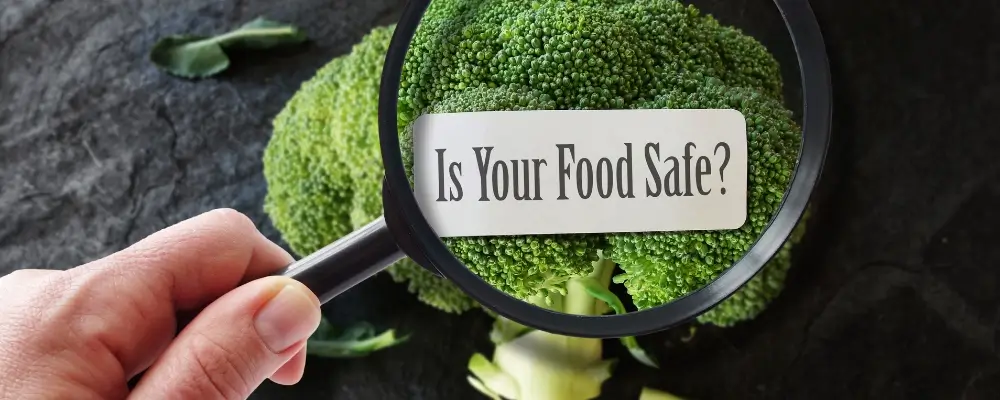Food safety is of paramount importance in today’s global food system. Understanding food safety standards is essential to protect consumers from foodborne illnesses and ensure businesses operate responsibly. These standards set the ground rules for how food is produced, processed, and handled across the supply chain.
In this blog, we’ll delve into the definition of food safety standards, their crucial importance, examples from around the world, and the dire consequences of failing to comply.
What are Food Safety Standards?
Food safety standards are defined as guidelines and regulations developed by governmental, international organizations, and industry groups to ensure the safety and quality of food throughout its supply chain. These standards are designed to minimize the risks of food contamination, prevent foodborne illnesses, and safeguard consumers and workers involved in producing, processing, packaging, and distributing food products.
The scope of food safety standards encompasses every aspect of food handling, from procuring raw materials and ingredients through processing and manufacturing to packaging and distribution. The primary goal is to provide a structured framework that ensures food is safe for consumption, thereby protecting public health.
Internationally recognized food safety standards, such as those issued by the World Health Organization (WHO) and the Global Food Safety Initiative (GFSI), along with local and regional regulations, offer comprehensive guidelines that must be adhered to by businesses operating within the food industry. These standards cover critical areas including but not limited to hygiene, food handling practices, traceability, and allergen management.
Adherence to food safety standards is crucial for protecting consumers from foodborne diseases and health hazards and maintaining the integrity and reputation of food businesses. Compliance with these standards helps organizations avoid legal repercussions, financial losses, and damage to their brand caused by food safety incidents.

Importance Of Food Safety Standards
The importance of food safety standards cannot be overstated, as they play a crucial role in ensuring the health and safety of consumers and the integrity of the food supply chain. Here are several key reasons why food safety standards are essential:
1. Protecting Public Health
- The Core Objective: The primary goal of food safety standards is to prevent foodborne illnesses. Contaminated food can contain bacteria, viruses, parasites, and toxins that cause various diseases, sometimes severe or even fatal.
- Vulnerable populations: Standards are vital to protect the most at-risk individuals like children, the elderly, or those with compromised immune systems.
2. Building Consumer Trust
- Reputation is Key: When consumers know a company follows rigorous safety standards, it builds confidence in their products. This trust translates into brand loyalty and a preference for those products and businesses.
- Recalls Are Damaging: Food safety lapses and recalls can erode public trust and tarnish a company’s reputation, potentially leading to severe financial and legal consequences.
3. Compliance and Avoiding Penalties
- Government Regulations: Food safety standards are often codified into law. Not complying can lead to fines, mandatory shutdowns, and even criminal prosecution in cases of severe negligence.
- Lawsuits: If contaminated food causes illness, businesses might face lawsuits from affected consumers and incur significant financial and reputational damage.
4. Improving Operational Efficiency
- Proactive, Not Reactive: Implementing food safety standards helps businesses establish preventive systems and a food safety culture. This minimizes the risk of costly incidents that disrupt production.
- Waste Reduction: By preventing contamination, spoilage, and product recalls, standards help businesses reduce waste and conserve resources.
5. Facilitating Global Trade
- Meeting International Requirements: Adherence to internationally recognized standards like the Codex Alimentarius smooths the export of food products. It demonstrates to foreign markets that food items meet global safety expectations.
- Accessing Wider Markets: Meeting these standards can open avenues to new international markets, expanding food businesses’ reach and growth potential.
Additional Considerations
- Ethical Responsibility: Businesses have a moral obligation to provide safe food to consumers. Food safety standards are a tool to uphold this responsibility.
- Employee Well-being: Strong food safety practices protect the employees handling and processing food, reducing their risk of exposure to harmful pathogens.
In Summary, Food safety standards are essential for safeguarding public health, building consumer confidence, ensuring legal compliance, improving operational efficiency, and expanding business opportunities. It’s both a fundamental responsibility of food businesses and a competitive advantage.

5 Food Safety Standards Around the World
Food safety standards are crucial regulations and guidelines established to ensure the safety and quality of food products from production to consumption. These standards are designed to prevent foodborne illnesses and ensure safe food handling practices, protecting consumers and enhancing the quality of the food supply.
Around the world, various organizations and governments have developed food safety standards tailored to their specific needs and challenges. Here are five significant food safety standards from different regions:
1. Food Safety Modernization Act (FSMA) – United States
- Emphasis on Prevention: The FSMA requires food facilities to have Hazard Analysis and Risk-Based Preventive Controls (HARPC) plans. This means businesses must analyze their production process, pinpointing where contamination risks are likely. Then, they must implement specific, science-based controls to minimize those risks.
- Expanded FDA Authority: FSMA gives the FDA broader powers, including mandatory recall authority and increased inspections. It also strengthens oversight of imported foods, holding foreign suppliers to the same standards as domestic producers.
2. European Food Safety Authority (EFSA) – European Union
- Science-Driven Approach: EFSA operates on the principle of separating risk assessment from risk management. Scientists provide independent analysis of scientific evidence, while policymakers decide on regulations. This helps ensure that food safety decisions in the EU are grounded in the best available research.
- Wide Scope: Beyond the standard food safety concerns, EFSA also plays a role in areas such as genetically modified organisms (GMOs), animal welfare, and plant health. This comprehensive approach reflects the interconnected nature of food systems and potential food-related risks.
3. Food Standards Australia New Zealand (FSANZ)
- Consumer Focus: While rigorous on safety, FSANZ standards also aim to provide transparent information for consumers. This includes labeling requirements, identifying potential allergens, listing ingredients in detail, and providing nutritional information.
- Collaboration: FSANZ works closely with stakeholders across the food industry, from farmers and manufacturers to consumer groups. This collaborative approach helps ensure that food standards are both practical and effective.
4. Food Standards Agency (FSA) – United Kingdom
- Practical Guidance: The FSA is known for producing user-friendly materials that help businesses understand and comply with regulations. They offer tools for food hygiene ratings, allergen management, and incident reporting.
- Transparency and Openness: The FSA emphasizes communication with the public. They regularly publish reports on food safety issues, alerts, and recall information, fostering consumer trust and awareness.
5. Codex Alimentarius – International Standard
- Global Impact: While adherence to the Codex is voluntary, its influence is extensive. Many countries align their national food safety laws with the Codex standards to facilitate trade and ensure consistent protection worldwide.
- Evolving Standards: The Codex is constantly updated to reflect new scientific findings, emerging food technologies, and shifts in consumer preferences. This is crucial to maintaining its relevance in a dynamic food landscape.
Key Takeaway for Businesses: Food safety standards are not stagnant. They change over time, and it’s the food business’s responsibility to stay informed. They must also understand the interaction between the global standards and those specific to their location, ensuring they meet all the requirements applicable to their operations.

Consequences of Violating Food Safety Standards
Violating food safety standards can seriously affect food businesses, their customers, and the broader public health system. The repercussions of non-compliance range from immediate health risks to long-term damage to a company’s reputation and financial stability. Here are some of the critical consequences of failing to adhere to food safety standards:
1. Public Health Impact
- Foodborne Illnesses: The most immediate consequence is the risk of consumers getting sick. This can range from mild discomfort to severe illness, hospitalization, or even death in extreme cases.
- Outbreaks: Large-scale contamination incidents in the food supply chain can lead to widespread outbreaks, affecting hundreds or thousands of people.
- Long-term Health Consequences: Certain foodborne pathogens can cause enduring health problems even after the initial infection – like kidney failure, reactive arthritis, and chronic health conditions.
2. Legal & Financial Repercussions
- Government Fines: Regulatory bodies like the FDA or local health departments can impose hefty fines for food safety violations, particularly in cases of repeated or serious infractions.
- Lawsuits: Individuals who become ill due to contaminated food may file lawsuits against the responsible food business, seeking compensation for medical expenses, lost wages, and pain and suffering.
- Mandatory Shutdowns: In severe cases or those with repeated violations, authorities may temporarily or permanently close facilities until safety concerns are addressed.
- Criminal Charges: Company officials could face criminal charges in cases of egregious negligence or intentional disregard for food safety.
3. Damage to Reputation
- Loss of Consumer Trust: News of a food safety incident spreads quickly. The public may lose trust, avoiding the brand or similar food products.
- Negative Media Attention: Recalls, foodborne illness outbreaks, and legal actions frequently receive widespread media coverage, damaging the company’s image and tarnishing its reputation.
- Difficulty Rebuilding: Regaining consumer confidence after a major violation can be extremely challenging and time-consuming.
4. Disruptions to Business Operations
- Product Recalls: Recalls are costly – they involve retrieving products from the market, destroying inventory, and potentially causing supply chain disruptions.
- Production Halts: During investigations and corrective actions, production may be required to halt, leading to revenue loss and missed orders.
- Increased Insurance Premiums: A history of food safety violations can make obtaining affordable insurance coverage difficult.
5. Impact On Employees
- Lowered Morale: When a company doesn’t prioritize food safety, it can demoralize employees and lead to high turnover.
- Risk of Liability: In some cases, individual employees might also face legal action if they knowingly disregard food safety procedures.
Important Note: The severity of these consequences depends on the specific violation, the scale of the problem, and the company’s track record. Even seemingly minor deviations from standards can have a significant domino effect.
A proactive approach is key: That’s why prevention is emphasized across all food safety systems – adhering to regulations is far less costly (both financially and in terms of reputation) than dealing with the fallout of safety failures.
Conclusion
Ultimately, adhering to food safety standards isn’t just about avoiding penalties or negative consequences – it’s a fundamental responsibility for anyone involved in the food industry. From farm to table, implementing rigorous safety practices protects public health, fosters consumer trust, and ensures business success and ethical accountability. By understanding and committing to these standards, food businesses play a vital part in safeguarding the well-being of their customers and the integrity of the global food supply.

